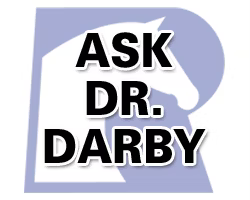Ask Dr. Darby Bonomi

Reprinted Courtesy of California Riding Magazine
Darby Bonomi PhD. is a practicing psychologist and consultant that works with people of all ages to achieve lasting change and establish foundations for mental wellness. Darby combines her life-long experience in the equestrian world with her vast toolbox of psychological and coaching interventions. Riders of all levels and their families reclaim joy in the sport, leading the way to improved performance and better health.
Dear Dr. Darby,
I am an older rider who struggles with ‘blanking out’ during my rides. It happens all of a sudden, and I have no idea why. It’s a very frustrating problem! I have ridden most of my life—it’s not that I don’t know how! My trainer is frustrated with me too. Can you help?
—A. T., Los Angeles, CA
Dear A.,
Thanks for your question. I have worked with a number of riders in different disciplines who have described a similar challenge—many of them are older, as you are. It is very frustrating knowing what to do, but not being able to do it, and then having to deal with the consequences. As we all know too well, whether you’re asking for a canter transition or approaching a jump, it’s imperative to stay present in the saddle in order to be effective.
First, try to diffuse your frustration. Let go of the idea that you can’t figure it out and embrace the fact that you will. I appreciate that you are frustrated, but now we need you to step into an inquisitive state in order to understand the problem and develop a solution. Frustration only makes it worse. Once you cultivate acceptance of the situation, you are on the road to working it out.
Your next job is to be a detective: you need to figure out the trigger. Make the next few rides about checking in with yourself at every step, with the intention to observe what sends you into your blank-out state. Remember, there IS a trigger.
In my experience, the trigger is often fear—usually fear of making a mistake. One factor that makes the whole situation worse is fatigue—both mental and physical. Take stock: when does the blank-out occur? Is it usually at the end of the ride or lesson? Or is it at the beginning? Does it happen after you’ve done something really well? Keep a log so that you can record and analyze the pattern.
Once you are more aware of the pattern, you can address it effectively. One of my dressage riders insisted that her blank-out was not due to physical fatigue, but what we realized upon further investigation was that she was mentally fatigued. The solution was to insert a couple short breaks earlier in the lesson. The breaks allowed her to relax her mind after a complex series of movements and then regroup. Blanking out was the signal that her brain was on overload.
For another client, blanking out was an expression of her fear that she would make ‘the wrong choice’ in a bending line. If she had any doubt about where she was, she would become absent, leaving her horse wondering what to do. It really was panic response set off by her perfectionism. Once she could let go of the idea of needing to be perfect, she could stay in her body and make some sort of decision in the line, even if it was a timid one. Some decision is better than no decision! And, her horse was very willing to accommodate any option; he just didn’t like being abandoned.
In general, the solution to this kind of problem is to train yourself to be present for every step. Try talking out loud to yourself during your ride. Describe to yourself what you are doing at the moment, count your strides, or simply repeat a mantra. I have found that talking out loud, however funny that might sound, helps riders not only stay present but also detect trigger moments. In addition, if you are talking then you are also breathing, which also helps us stay present and grounded.
Good luck and let me know how it goes!
—Darby Bonomi, PhD
If you have a question for performance psychologist Darby Bonomi, PhD., please submit it to Darby@darbybonomi.com. You are welcome to ask a question anonymously, but please provide relevant background regarding your experience and other details that enable her to best answer your question.
Interested in working with Darby Bonomi, PhD? Contact her today to get a quote for her Sports Psychology Services.
